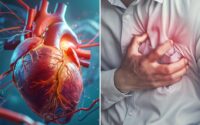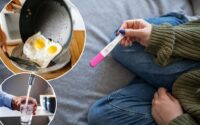I was headbutted by a dog — it exposed stage 3 breast cancer
Veterinary nurse Angie Shaw was sick as a dog.
She just didn’t know it — until she treated one frisky Labrador, who headbutted her during an examination. The playful push left her with a painful, persistent lump on her chest that would soon lead to a breast cancer diagnosis.
The lump was still sore a week after the hit, prompting Shaw to visit her doctor — where she was referred for tests that confirmed a fast-growing form of breast cancer.
“I thought it was a cyst,” the grandmother-of-three told South West News Service. “When I was told that I would have to have surgery, chemotherapy and then radiotherapy my whole world fell apart.”
Shaw underwent an operation to remove the invasive tumor — which had grown in just 13 days since her diagnosis by two millimeters.
Although the UK-based vet nurse admits the dog hitting her chest was “purely coincidental,” if it hadn’t, doctors said it would likely have taken another 10 months to find the stage three tumor due to its position.


“It would have been too late,” she said. “That pet saved my life.”
Shaw has undergone six rounds of chemotherapy over 18 weeks and 15 doses of chemotherapy.
“I said that I don’t want sympathy or special treatment as I am living with cancer, not dying from it,” Shaw said of her treatment, adding that she’s used her experience to encourage women to get any lumps checked.
“I will lose my hair so I will be wearing a wig. Tell me if it’s wonky or if the label is showing,” she joked, then pleaded, “but for goodness sake, get any lumps checked.”
Shaw said breast cancer is thought of as a “taboo subject,” but wants people to know there is “nothing to be ashamed of.”

“There’s nothing I have done to cause it. There’s nothing I could have done to prevent it,” she said, adding she feels “lucky” because the cancer was caught in time.
“I lost some of my hair during the chemotherapy. It is a small price to pay,” she continued. “[The doctors] are quite happy they have got all the cancer. It shows that early diagnosis is so important.”
Shaw says her near-death experience has given her a new perspective on life.
“You realize how special life is and how quickly it can turn around. I have been given a second chance,” she reflected. “You learn to make the most of who and what is important to you.”


